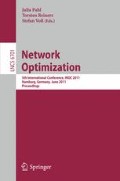Abstract
We study the maximum flow problem subject to binary disjunctive constraints in a directed graph: A negative disjunctive constraint states that a certain pair of arcs in a digraph cannot be simultaneously used for sending flow in a feasible solution. In contrast to this, positive disjunctive constraints force that for certain pairs of arcs at least one arc has to carry flow in a feasible solution.
Negative (positive) disjunctive constraints can be represented by a conflict (forcing) graph whose vertices correspond to the arcs of the underlying graph, and whose edges encode the constraints.
We show that the maximum flow problem is strongly \(\mathcal{NP}\)-hard, even if the conflict graph contains only isolated edges and the network consists only of disjoint paths. For forcing graphs the problem can be solved efficiently if fractional flow values are allowed. If flow values are required to be integral we provide the sharp line between polynomially solvable and strongly \(\mathcal{NP}\)-hard instances.
Access this chapter
Tax calculation will be finalised at checkout
Purchases are for personal use only
Preview
Unable to display preview. Download preview PDF.
References
Ahuja, R., Magnanti, T., Orlin, J.: Network Flows: Theory, Algorithms, and Applications. Prentice Hall, Englewood Cliffs (1993)
Bodlaender, H., Jansen, K.: On the complexity of scheduling incompatible jobs with unit-times. In: Borzyszkowski, A.M., Sokolowski, S. (eds.) MFCS 1993. LNCS, vol. 711, pp. 291–300. Springer, Heidelberg (1993)
Darmann, A., Pferschy, U., Schauer, J., Woeginger, G.: Paths, trees and matchings under disjunctive constraints. Discrete Applied Mathematics (to appear, 2011)
Gusfield, D., Naor, D.: Efficient algorithms for generalized cut trees. In: SODA 1990: Proceedings of the First Annual ACM-SIAM Symposium on Discrete Algorithms, pp. 422–433. SIAM, Philadelphia (1990)
Jansen, K.: An approximation scheme for bin packing with conflicts. Journal of Combinatorial Optimization 3, 363–377 (1999)
Pferschy, U., Schauer, J.: The knapsack problem with conflict graphs. Journal of Graph Algorithms and Applications 13(2), 233–249 (2009)
Picard, J.C., Queyranne, M.: On the structure of all minimum cuts in a network and applications. Mathematical Programming Studies 13, 8–16 (1980)
Author information
Authors and Affiliations
Editor information
Editors and Affiliations
Rights and permissions
Copyright information
© 2011 Springer-Verlag Berlin Heidelberg
About this paper
Cite this paper
Pferschy, U., Schauer, J. (2011). The Maximum Flow Problem with Conflict and Forcing Conditions. In: Pahl, J., Reiners, T., Voß, S. (eds) Network Optimization. INOC 2011. Lecture Notes in Computer Science, vol 6701. Springer, Berlin, Heidelberg. https://doi.org/10.1007/978-3-642-21527-8_34
Download citation
DOI: https://doi.org/10.1007/978-3-642-21527-8_34
Publisher Name: Springer, Berlin, Heidelberg
Print ISBN: 978-3-642-21526-1
Online ISBN: 978-3-642-21527-8
eBook Packages: Computer ScienceComputer Science (R0)

